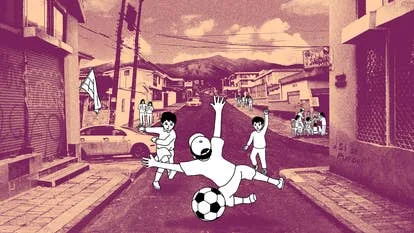
Despelote: A Nostalgic Trip to Ecuador’s 2002 World Cup Summer in a Video Game
Despelote is not just another football game. It's a poignant, pseudo-autobiographical journey back to the summer of 2001 in Ecuador, a time when the nation was gripped by football fever as its team sought to qualify for the World Cup for the first time. But beyond the sport, it's a reflective game about remembering, creating, and the power of community. The game, developed by Julián Cordero and Sebastián Valbuena, avoids the typical bombastic sports game tropes, opting instead for a grounded, neorealist depiction of life in Quito during this pivotal moment.
Several reviews and articles delve into Despelote's unique charm. One review notes that while the attempt is admirable, the game can feel aimless at times, with sequences repeating and gameplay being light. However, it excels in its visuals and the integration of actual clips from Ecuador's matches, creating a graphically interesting experience. The game effectively captures the childhood sense of having an interest in football but not the attention span to watch a full 90 minutes. Instead, the player interacts with the environment, kicks a ball around with friends, and, perhaps, annoys a few locals.

Another piece highlights how Cordero, the game's creator, sought to capture a specific moment in time, believing that video games are often “obsessed with creating worlds” at the expense of actually “capturing our own.” Despelote achieves this by rendering the 3-D world from photographs of actual neighborhoods in Quito, presented in a dreamy, impressionistic style. The game also incorporates field recordings to capture the bustling, excitable sounds of the city. Even more impactful are the improvised conversations between Quito residents, including Cordero’s parents, adding a layer of authenticity and heart to the game.
Eurogamer's review praises Despelote for its sharp moments and insightful approach. The reviewer notes how the game toymakes with its form, starting with its glorious intro sequence, a standout slow pan that sets the tone for what's to come. The transformation of the world as memories cross-contaminate from childhood to teenage years, and the incorporation of real photographs into the game's environment, add depth and complexity. The sound design, featuring real sounds recorded in Quito's central park, further enhances the game's immersive quality.
Despelote ultimately becomes a game about community and culture, blending hazy impressionism with brutal realism. The review emphasizes Cordero's willingness to turn the lens on himself and his development team, reflecting on the creative sacrifices and boundaries they were pushed to and also alluding to the economic and political turmoil that surrounded the 2002 World Cup qualifying stages in Ecuador.
With its unique blend of personal memoir, cultural documentary, and engaging gameplay, Despelote offers a refreshing departure from typical sports games. By immersing players in the sights, sounds, and emotions of Ecuador in 2001 and by turning the lens back on itself to explore the creative process, Despelote has created a one-of-a-kind experience that will resonate with players long after the credits roll.
Will you embark on this nostalgically charming and insightfully creative trip? Share your thoughts and experiences in the comments below!